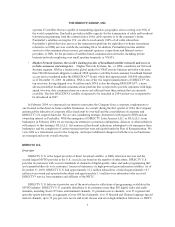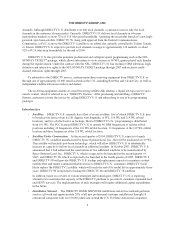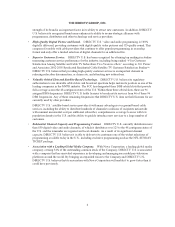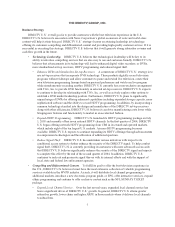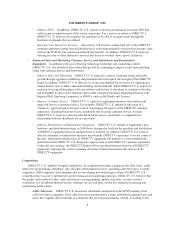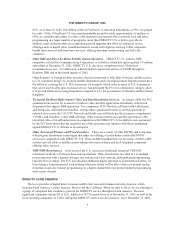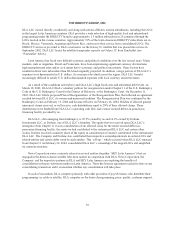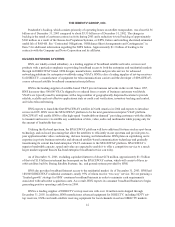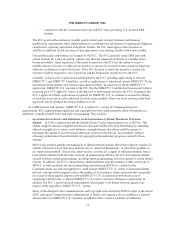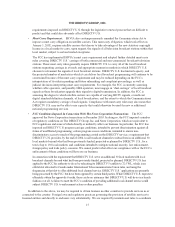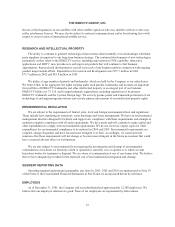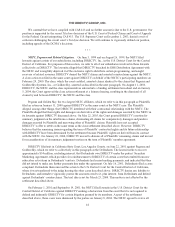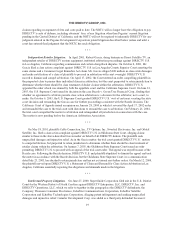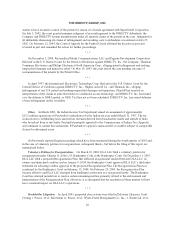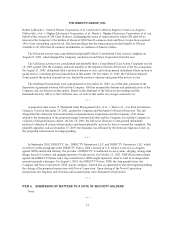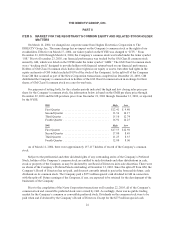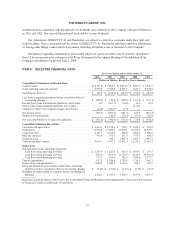DIRECTV 2003 Annual Report Download - page 20
Download and view the complete annual report
Please find page 20 of the 2003 DIRECTV annual report below. You can navigate through the pages in the report by either clicking on the pages listed below, or by using the keyword search tool below to find specific information within the annual report.THE DIRECTV GROUP, INC.
HNS faces global competition in the enterprise VSAT market, principally from Gilat Satellite Networks Ltd.
and ViaSat Inc., as well as from competitors employing terrestrial technologies such as frame relay and optical
fiber. HNS’ consumer DIRECWAY business faces competition from satellite providers and from other terrestrial
providers like cable companies, using cable modems, and RBOCs, using DSL technology. RCA/Thomson
Consumer Electronics, Samsung Electronics and Sony Corporation are the primary competitors in the
manufacture of DIRECTV set-top products.
ACQUISITIONS, STRATEGIC ALLIANCES AND DIVESTITURES
We review our competitive position on an ongoing basis and consider various acquisitions, strategic
alliances and divestitures. Consistent with our plans to focus on the DIRECTV business, we are currently
considering strategic alternatives with regard to HNS and our ownership interest in PanAmSat. With the
emergence of DLA LLC from bankruptcy in February 2004, we are turning our attention to potential
combinations, alliances or other initiatives with respect to that business. There can be no assurance that we will
be successful in any of these initiatives.
Certain of DIRECTV U.S.’ and PanAmSat’s financing arrangements contain limitations on their ability to
acquire and dispose of assets or to enter into strategic alliances. Their ability to take these actions may require the
consent of lenders. There can be no assurance that we will be able to obtain such consent, if required.
REGULATION
Our businesses are subject to government regulation, primarily by the FCC and, to a certain extent, by
Congress, other federal agencies, state and local authorities and the International Telecommunications Union, a
specialized agency of the United Nations within which governments and the private sector coordinate global
telecommunications networks and services. Depending upon the circumstances, noncompliance with legislation
or regulations promulgated by these entities could result in the suspension or revocation of licenses or
registrations, the termination or loss of contracts or the imposition of contractual damages, civil fines or criminal
penalties.
This section sets forth a summary of regulatory issues pertaining to the operations of our geosynchronous,
or GEO, satellites used in connection with DIRECTV’s operations and our other businesses generally and is not
intended to describe all present and proposed government regulation and legislation affecting our businesses.
•FCC Regulation Under the Communications Act. The Federal Communications Act of 1934
established the FCC, and gave the agency broad authority to regulate the use of the radio spectrum.
Based on the Communications Act, the FCC has general authority to promulgate rules and regulations in
order to ensure that the spectrum is used in an efficient manner consistent with the public interest,
convenience and necessity. In addition, in response to technological, social and political changes in the
past seventy years, Congress has continued to shape the FCC’s role in spectrum management by
amending the Communications Act through numerous subsequent statutes.
The ownership and operation of our GEO satellites and DIRECTV U.S.’ DBS system is regulated
by the FCC primarily for:
• the licensing of satellites, earth stations and ancillary authorizations;
• the assignment of frequencies and orbital slots;
• compliance with the terms and conditions of assignments and authorizations, including
required timetables for construction and operation of satellites;
• avoidance of interference by and to operations of other entities that make use of the radio
spectrum; and
13


